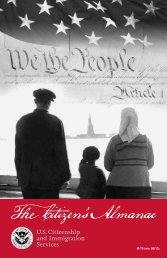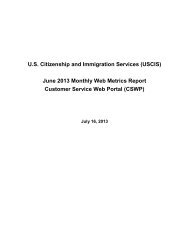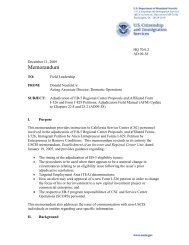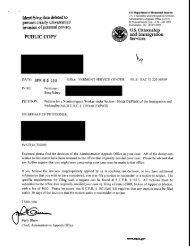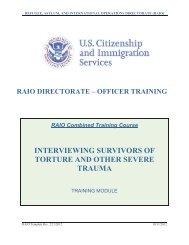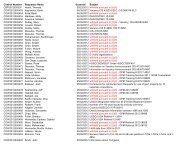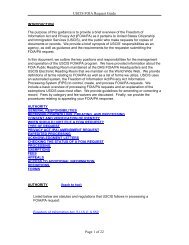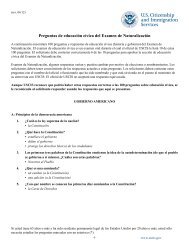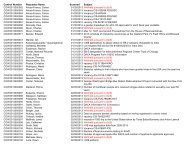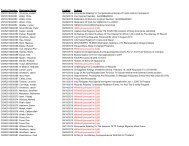~DtJitltk., - uscis
~DtJitltk., - uscis
~DtJitltk., - uscis
Create successful ePaper yourself
Turn your PDF publications into a flip-book with our unique Google optimized e-Paper software.
Page 36<br />
opinions statements submitted as expert testimony. See Matter of Caron International, 19 I&N<br />
Dec. at 795. However, USCIS is ultimately responsible for making the final determination<br />
regarding an alien's eligibility for the benefit sought. [d. The submission of letters from<br />
individuals, especially when they are colleagues of the beneficiary without any prior knowledge<br />
of the petitioner's work, supporting the petition is not presumptive evidence of eligibility; USC IS<br />
may evaluate the content of those letters as to whether they support the alien's eligibility. See id.<br />
at 795-796; see also Matter (!f V-K-, 24 I&N Dec. at 500, n.2.<br />
While the AAO found that the beneficiary failed to meet the leading or critical role criterion<br />
pursuant to the regulation at 8 C.F.R. § 204.5(h)(3)(viii), the AAO notes that the petitioner<br />
demonstrated that the beneficiary performed in a leading or critical role for PNN and the<br />
petitioner without establishing that they have distinguished reputations. Evidence of the<br />
beneficiary'S roles with organizations that have a distinguished reputation is far more persuasive<br />
that the beneficiary "is one of that small percentage who have risen to the very top of the field of<br />
endeavor." See 8 C.F.R. § 204.5(h)(2).<br />
Finally, the AAO cannot ignore that the statute requires the petitioner to submit "extensive<br />
documentation" of the beneficiary's sustained national or international acclaim. See section<br />
203(b)(1 )(A) of the Act. The commentary for the proposed regulations implementing section<br />
203(b)(l)(A)(i) of the Act provide that the "intent of Congress that a very high standard be set for<br />
aliens of extraordinary ability is reflected in this regulation by requiring the petitioner to present<br />
more extensive documentation than that required" for lesser classifications. 56 Fed. Reg. 30703,<br />
30704 (July 5, 1991). Although the AAO found that the beneficiary failed to meet the scholarly<br />
articles criterion pursuant to the regulation at 8 C.F.R. § 204.5(h)(3)(vi), the AAO notes that the<br />
petitioner failed to submit any English translations reflecting that the beneficiary'S blogs were, in<br />
fact, scholarly articles. Again, the petitioner submitted numerous foreign language documents<br />
without any English language translations pursuant to the regulation at 8 C.F.R. § 103.2(b)(3).<br />
The AAO is not persuaded that such evidence that fails to comply with the basic regulatory<br />
requirements equates to "extensive documentation" and is demonstrative of this highly restrictive<br />
classification. The truth is to be determined not by the quantity of evidence alone but by its<br />
quality. Matter of Chawathe, 25 I&N Dec. 369 (AAO 2010) citing Matter of E-M- 20 I&N Dec.<br />
77,80 (Comm'r. 1989).<br />
In this matter, the evidence of record falls short of demonstrating the benficiary's sustained<br />
national or international acclaim as a vice president in advertising and marketing. The regulation<br />
at 8 c.F.R. § 204.5(h)(3) requires "[a] petition for an alien of extraordinary ability must be<br />
accompanied by evidence that the alien has sustained national or international acclaim and this<br />
his or her achievements have been recognized in the field of expertise." While the petitioner<br />
submitted documentation demonstrating that the beneficiary is active in the advertising and<br />
marketing field, the documentary evidence is not consistent with or indicative of sustained<br />
national or international acclaim.<br />
The conclusion the AAO reaches by considering the evidence to meet each category of evidence<br />
at 8 C.F.R. § 204.5(h)(3) separately is consistent with a review of the evidence in the aggregate.



